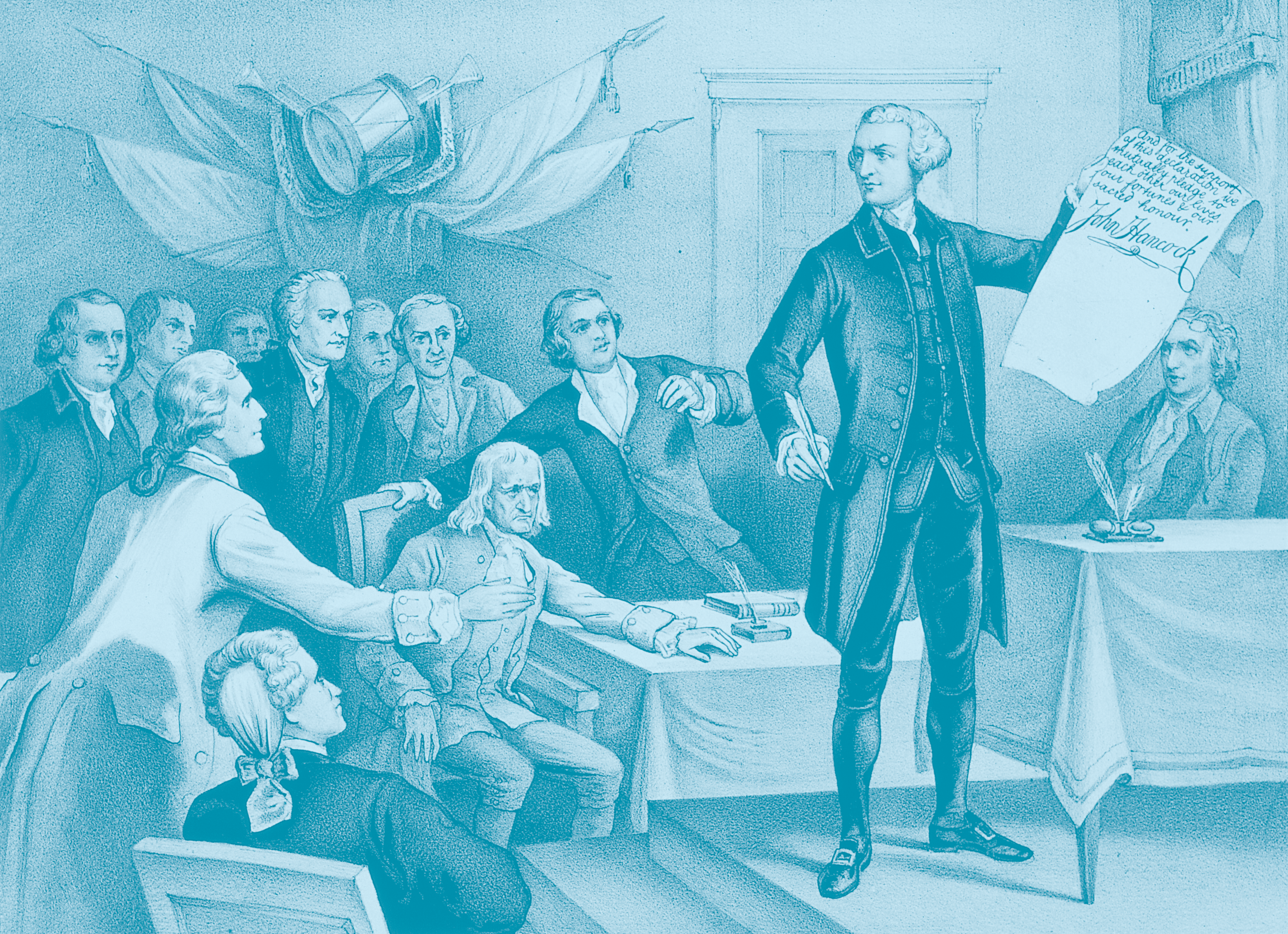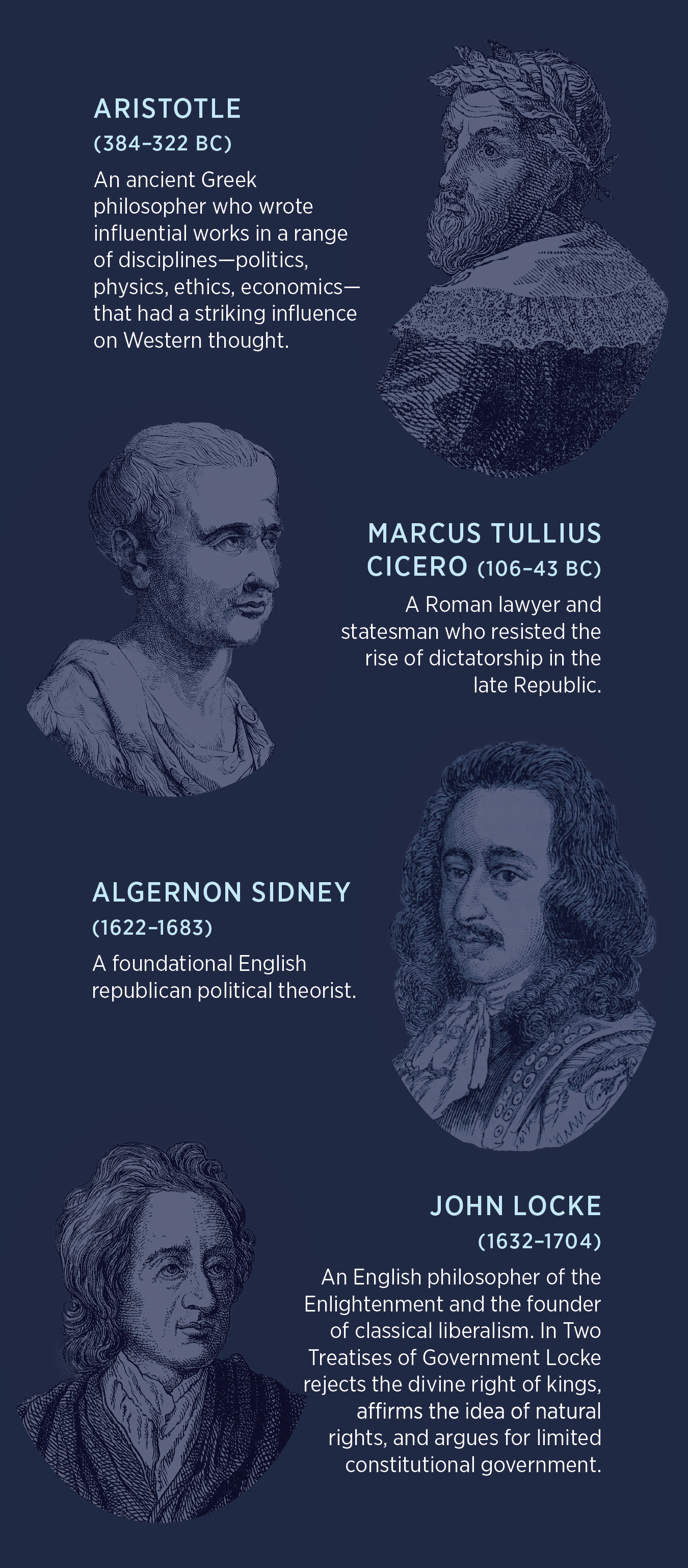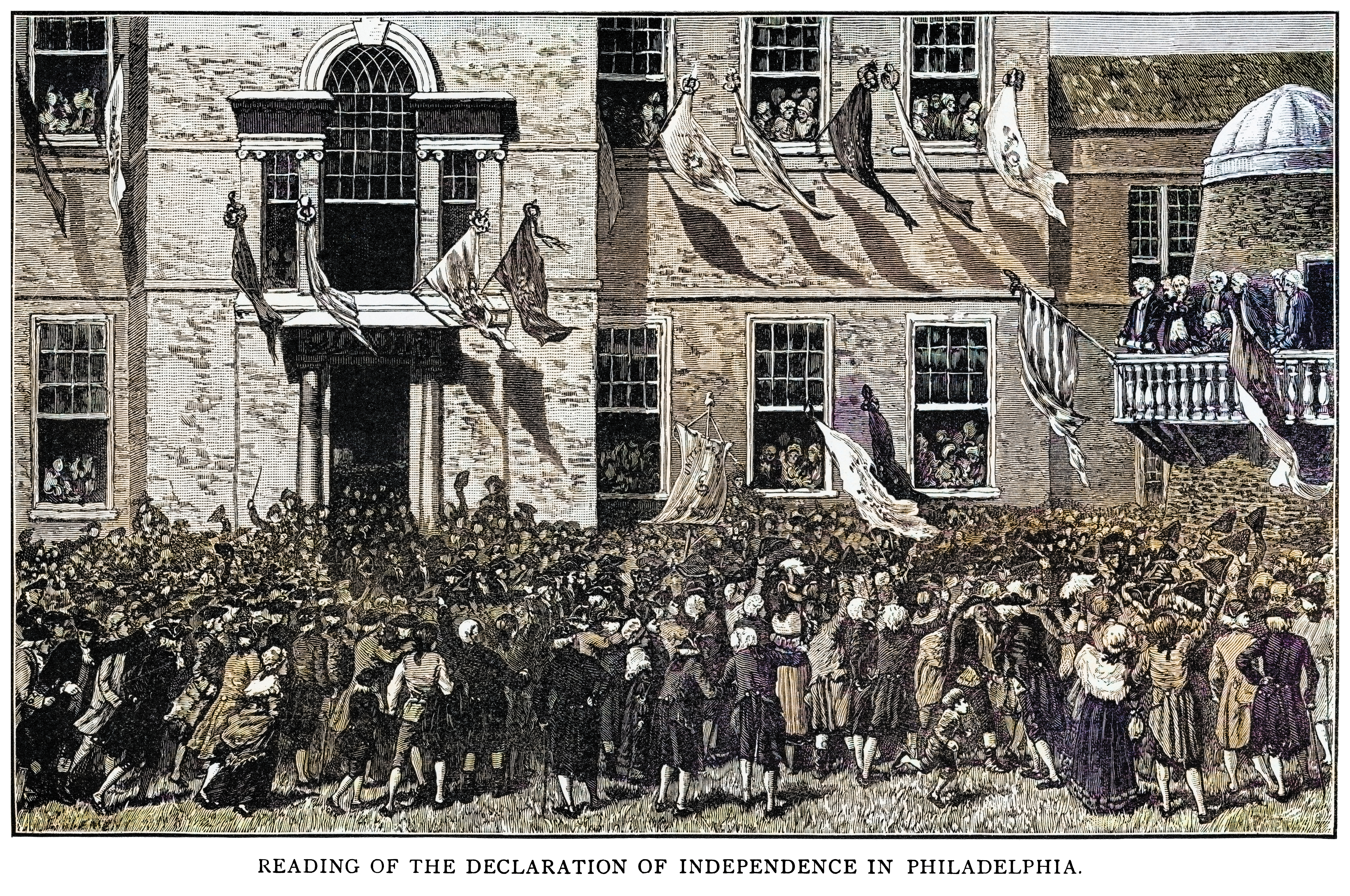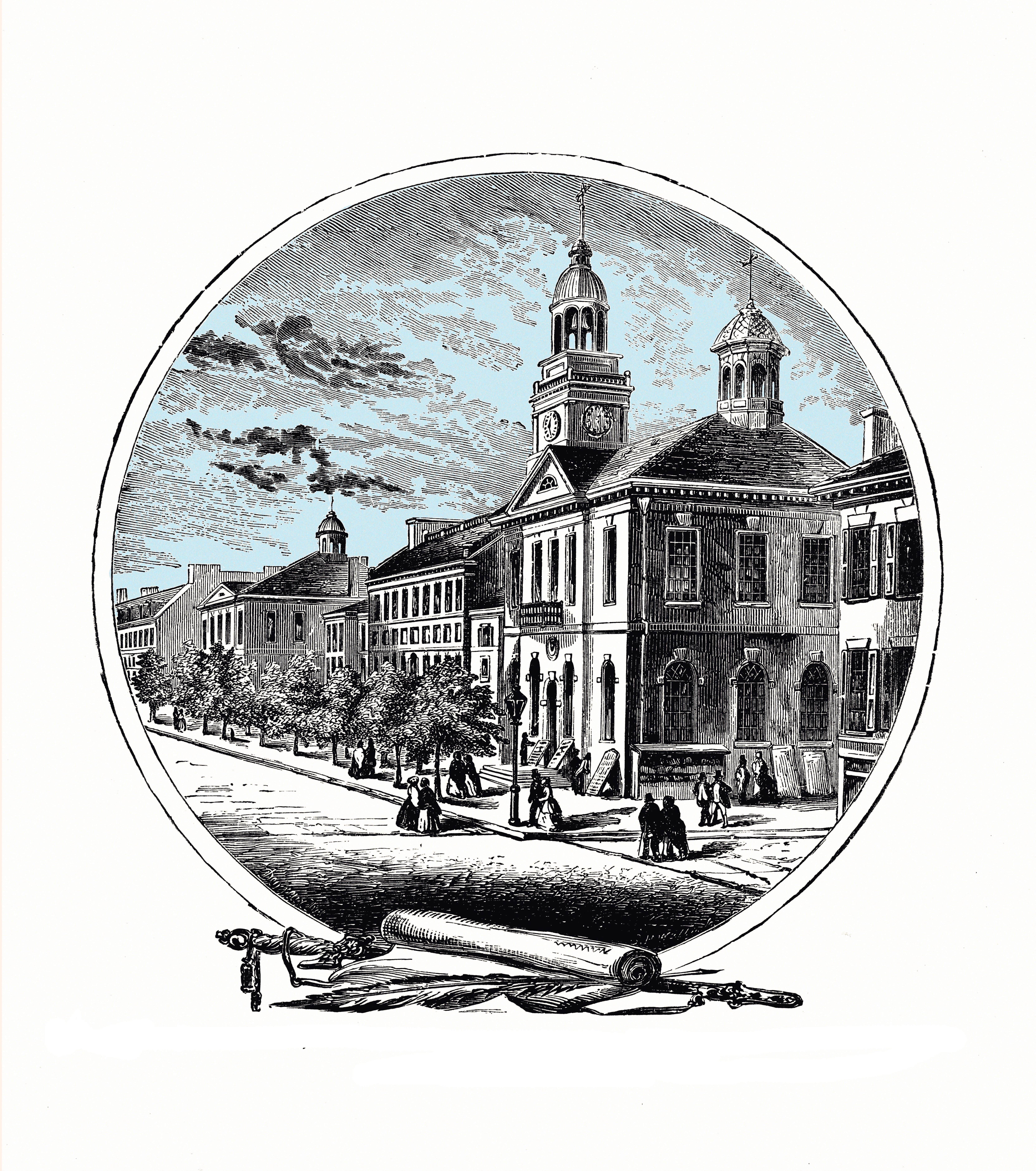There is confidence in the Declaration of Independence and the arguments made by the patriots in the years leading up to 1776. Leading loyalists or new Whigs warned of dreadful consequences that would follow any resistance to Britain. This was premised not only on the power of Britain to crush the colonists, but also on their view that law and government were the sole source of order in society. Take that away, and night would fill the void. But the classic Whig synthesis that inspired our Founders, which found within history, philosophy, and law the record of liberties articulated and at times achieved in the British and Western constitutional tradition, also discovered in natural law a foundation for liberty that the government did not create but must support with its laws. Just as significant, natural law reasoning provided clear bounds to power, making it clear when the government overstepped its authority.
Jefferson’s response to the question of the originality of the Declaration of Independence frames its essence:
Neither aiming at originality of principle or sentiment, nor yet copied from any particular or previous writing, it was intended to be an expression of the American mind…. All its authority rests then on the harmonizing sentiments of the day, whether expressed in conversation, in letters, printed essays, or the elementary books of public right, as Aristotle, Cicero, Locke, Sidney, etc.20
Such confidence was heavily influenced by the early Enlightenment theorist John Locke, who gave the Founders the ideas and language of political and economic freedom, the protection of which rested in republican and limited government among a citizenry of equals. Locke articulated a natural social and economic order that vindicated for Jefferson and many other colonists the individual exercise of rights and reinforced conceptions of liberty separating a private order of voluntary arrangements from a public order of government that prevented force and fraud. This conception of liberty that issues from the inherent sociability of man forms the basis for a free economy and limited government as expressed in Locke’s monumental Second Treatise of Government (1690). The similarities in language between Locke’s appeal to the natural social order and the Declaration’s preamble are unmistakable. Locke did not invent this conception of rights and liberties, but he did contribute mightily to its ongoing development and expression.

Other scholars find a civic communitarianism in colonial revolutionary rhetoric that upheld public virtue, reflecting ancient sources in Athens and Rome that discoursed on political power’s inherent capacity to corrupt human beings. Statesmen must possess civic virtue, but such virtue alone was not enough to prevent corruption: The composition of the government was the crucial ingredient. The solution was balanced government, separating the offices of government (executive, legislative, judicial) from one another. This civic republicanism reviewed history to discover examples of a well-ordered society displayed in government where power did not flow untrammeled from an elite to govern the masses. The different elements of the political order had some measure of representation and the ability to check power. Part of this tradition is evident in Jefferson’s correspondence with his references to Aristotle and Cicero as part of the harmonizing elements of the “American mind.” To them, add Polybius and Tacitus, along with the high Renaissance tradition, to the Founders’ historical tableau, who concluded that limited, balanced government presented the best opportunity for public virtue to emerge.
Other scholars list appeals in revolutionary pamphlets and sermons to biblical authorities for the confidence to challenge Britain.21 Americans cited biblical authorities during the revolutionary period far more than they cited Locke, Montesquieu, and Sir William Blackstone, the most frequently cited liberal and legal theorists. They took inspiration from Moses, as the early Americans also desired to lead themselves out of tyranny and into the promised land. From Samuel, they learned Godly leadership and its blessings. These biblical authorities revealed to them a divine ground for liberty, a journey to freedom, resistance to tyrants, and the duties of citizenship and government authority.22

English legal practice relied on the covenant tradition, which the colonists brought to North America. The “covenanting” tradition in the Mayflower Compact (1620), among many other early framing documents in North America, joins God’s authority and His guarantees to any contract or association that is established. The compact tradition replaced much of the covenant tradition in the colonies and became the dominant form adopted in the new state constitutions of 1776. Here the people organize themselves, create a government, set forth their basic values, and describe the institutions for decision-making, but they do so without an explicit appeal to God as the guarantor and judge of their efforts. The Declaration of Independence accomplished many of the objectives of a compact, with the Articles of Confederation and, later, the Constitution forming the government that would make political choices.
The Declaration contains four references to divinity. “The Laws of Nature and of Nature’s God” provide the “equal station” of the “thirteen united States of America,” enabling them to resist tyranny and build a free political existence. Their “unalienable Rights” are endowed by their Creator. In the final paragraph, they appeal to the “Supreme Judge of the world” to judge the “rectitude of our intentions” and state their “firm reliance on the protection of divine Providence” as they “pledge to each other our Lives, our Fortunes, and our Sacred Honor.” The Declaration, therefore, exists somewhere between a compact and a covenant, reflecting the wisdom of deeply religious people who also drafted a document that purely secular citizens could comprehend and adopt as a compact.
The Scottish Enlightenment’s “moral sense” was formulated by 18th century Scottish thinkers and provided a crucial ingredient to the American mind. Jefferson recommended the work of Lord Kames—one of that tradition’s leading thinkers—in correspondence in 1771.23 Individuals, Kames taught, knew right from wrong and could exercise justice in their social and commercial relationships. This moral sense was like the other senses. Every person possesses it, and it gets stronger with use but darkened by error and disordered acts. Thus, the moral sense argument meant individuals could know right from wrong. It reinforced the Lockean teaching that in the state of nature, individuals were not wolves devouring one another; they were capable of trading and peaceably associating with each other. Admittedly, there were some exceptions, but in general, establishing a government bound by law could enable the moral sense to guide citizens in their relations and lead to their greater flourishing.
Another historical tradition that influenced the colonists was the full record of common law liberty that had shaped Britain and which they had brought to their colonies and adapted. England’s legal and constitutional history reflected competing powers, and its judges ingeniously blended these traditions. This law emerged to manage the complexity of English society—its towns, cities, landowners, and merchants—and became the English common law.
The establishment of a largely independent legal system was crucial to those who opposed absolute monarchical power. Unlike the Tories, who were the party of the British monarchy and supported its absolutist pretensions, the colonists looked to custom, precedent, and the evolution of institutions not to validate the King and royal prerogative, but to understand how power had been limited and to inform the means for limiting it now. The common law judge claimed to discover, not make, law by reviewing precedent and referring “to practices and rights of immemorial origin, expressed through the ages by the practices of the whole kingdom, rather than to the power of the monarchical decree.”24 “[T]he liberty, the unalienable, indefeasible rights of men,” wrote John Adams in a letter to the Boston Gazette in 1763, “the honor and dignity of human nature…and the universal happiness of individuals, [were] never so skilfully and successfully consulted, as in that most excellent monument of human art, the common law of England.”25 Now this balance was being undone by Parliament, which was behaving in an absolute manner, providing yet another reason for the colonists to oppose British designs on their liberty.26

History and the common law, however, were not enough to make the argument for separation from Britain because they were not ultimately the source of the people’s rights. The final source that explains the Americans’ confidence is the natural and divine order that was the ultimate source of natural rights. This order set bounds on government and could define transgressions of power when they were committed. These rights did not come from written law or custom; they came from nature and were held inalienably by all people.
Natural law has a pedigree stretching back to Plato and Aristotle, the Stoics, and the Scholastics. Natural law and natural rights discourse had long been part of colonial opposition to Britain and the assertions of parliamentary supremacy over the colonists. In 1763, leading colonial attorney James Otis proclaimed that “[t]here can be no prescription old enough to supersede the law of nature, and the grant of God Almighty, who has given to all men a natural right to be free.”27 Otis further addressed the problem of parliamentary absolutism as a problem of authority and natural law:
To say the Parliament is absolute and arbitrary, is a contradiction. The parliament cannot make 2 and 2, 5; Omnipotency cannot do it…. Parliaments are in all cases to declare what is parliament that makes it so: There must be in every instance a higher authority, viz. GOD. Should an act of Parliament be against any of his natural laws, which are immutably true, their declaration would be contrary to eternal truth, equity and justice, and consequently void....[28]
In 1765, John Adams wrote “liberty must at all hazards be supported. We have a right to it, derived from our Maker.”29 Further:
Let it be known, that British liberties are not the grants of princes or parliaments, but original rights…coequal with prerogative and coeval with government.—That many of our rights are inherent and essential, agreed on as maxims and establish’d as preliminaries, even before a parliament existed.[30]
In 1775, Alexander Hamilton wrote “[t]he sacred rights of mankind are not to be rummaged for, among old parchments, or musty records. They are written, as with a sun beam, in the whole volume of human nature, by the hand of the Divinity itself; and can never be erased or obscured by mortal power.”31
Considerations on the Nature and the Extent of the Legislative Authority of the British Parliament, by James Wilson (one of six men who signed both the Declaration and the Constitution), impressed Jefferson greatly. The colonies, Wilson said, aim for “the enjoyment of those rights, to which we are entitled by the supreme and uncontrollable laws of nature.” He observed that “[a]ll men are, by nature, equal and free” and that “[a]ll lawful government is founded on the consent of those, who are subject to it: Such consent was given with a view to ensure and to increase the happiness of the governed….” This language sounds like that used in the Declaration. One paragraph from Wilson that Jefferson noted in his journal inquired, “Will it ensure and encrease the happiness of the American Colonies, that the parliament of Great-Britain should possess a supreme irresistible uncontrolled authority over them?” If so, he answered, the colonists “are, every moment, exposed to slavery.” This mirrors the Declaration’s phrasing of “absolute Despotism” and “absolute Tyranny.”32

These citations from Revolution-era literature, which are mere samples of an incredibly rich discourse, underline how reason, nature, divinity, and law led Americans to conclude they were increasingly the targets of despotic action. This encapsulates how the Whig tradition synthesized history, philosophy, law, and religion to direct the appeal to “the Laws of Nature and of Nature’s God” to bind government (“That to secure these Rights, Governments are instituted among Men”) and defined the transgressions justifying revolution (“that whenever any Form of Government becomes destructive of these Ends, it is the Right of the People to alter or abolish it”).
ENDNOTES:
20. Thomas Jefferson, letter to Henry Lee, May 8, 1825, National Archives, Founders Online, https://founders.archives.gov/documents/Jefferson/98-01-02-5212 (October 6, 2024).
21. Donald S. Lutz, The Origins of American Constitutionalism (Baton Rouge: Louisiana State University Press, 1988), pp. 13–22.
22. See, for example, Daniel L. Dreisbach, Reading the Bible with the Founding Fathers (New York: Oxford University Press, 2017).
23. Allen Jayne, Jefferson’s Declaration of Independence: Origins, Philosophy, and Theology (Lexington: University of Kentucky Press, 1998), pp. 66–74.
24. Eicholz, Harmonizing Sentiments, p. 75.
25. John Adams (“U”), letter to Boston Gazette, September 5, 1763, National Archives, Founders Online, https://founders.archives.gov/documents/Adams/06-01-02-0045-0009 (accessed October 6, 2024). Emphasis in original.
26. Bernard Bailyn, The Ideological Origins of the American Revolution (Cambridge, MA: Harvard University Press, 1967), p. 54, and Trevor Colbourn, ed., Fame and the Founding Fathers: Essays by Douglass Adair (Indianapolis: Liberty Fund, 1998), pp. xi–xliv.
27. James Otis, “The Rights of the British Colonies Asserted and Proved, 1764,” in The Founders’ Constitution, ed. Philip B. Kurland and Ralph Lerner (Indianapolis: Liberty Fund, 2001), Vol. 1, Chapter 2, Document 5, https://press-pubs.uchicago.edu/founders/documents/v1ch2s5.html (accessed October 6, 2024).
28. James Otis, “The Rights of the British Colonies Asserted and Proved, 1763,” in The American Republic: Primary Sources, ed. Bruce Frohnen (Indianapolis: Liberty Fund, 2002), p. 126, https://oll-resources.s3.us-east-2.amazonaws.com/oll3/store/titles/669/0082_LFeBk.pdf (accessed October 6, 2024). Emphasis in original.
29. John Adams, “A Dissertation on the Canon Law and the Feudal Law,” No. 3, September 30, 1765, https://founders.archives.gov/documents/Adams/06-01-02-0052-0006 (accessed October 6, 2024).
30. John Adams, “A Dissertation on the Canon Law and the Feudal Law,” No. 4, October 21, 1765, National Archives, Founders Online, https://founders.archives.gov/documents/Adams/06-01-02-0052-0007 (accessed October 6, 2024).
31. Alexander Hamilton, “The Farmer Refuted,” February 23, 1775, in The Founders Constitution, Chapter 3, Document 5, https://press-pubs.uchicago.edu/founders/documents/v1ch3s5.html (accessed October 6, 2024). Emphasis in original.
32. See James Wilson, Considerations on the Nature and the Extent of the Legislative Authority of the British Parliament (Philadelphia: William and Thomas Bradford, 1774), pp. 2 and 3, https://dn720404.ca.archive.org/0/items/bim_eighteenth-century_considerations-on-the-na_wilson-james_1774/bim_eighteenth-century_considerations-on-the-na_wilson-james_1774.pdf (accessed October 6, 2024).
